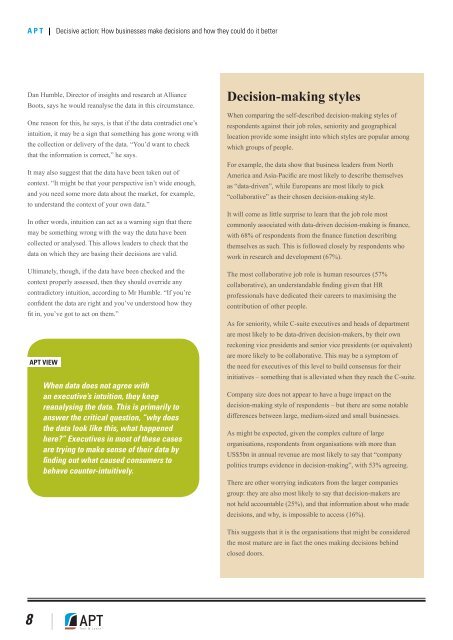Decisive Action - How businesses make decisions
Decisive Action - How businesses make decisions
Decisive Action - How businesses make decisions
Create successful ePaper yourself
Turn your PDF publications into a flip-book with our unique Google optimized e-Paper software.
APT | <strong>Decisive</strong> action: <strong>How</strong> <strong>businesses</strong> <strong>make</strong> <strong>decisions</strong> and how they could do it betterDan Humble, Director of insights and research at AllianceBoots, says he would reanalyse the data in this circumstance.One reason for this, he says, is that if the data contradict one’sintuition, it may be a sign that something has gone wrong withthe collection or delivery of the data. “You’d want to checkthat the information is correct,” he says.It may also suggest that the data have been taken out ofcontext. “It might be that your perspective isn’t wide enough,and you need some more data about the market, for example,to understand the context of your own data.”In other words, intuition can act as a warning sign that theremay be something wrong with the way the data have beencollected or analysed. This allows leaders to check that thedata on which they are basing their <strong>decisions</strong> are valid.Ultimately, though, if the data have been checked and thecontext properly assessed, then they should override anycontradictory intuition, according to Mr Humble. “If you’reconfident the data are right and you’ve understood how theyfit in, you’ve got to act on them.”APT viewWhen data does not agree withan executive’s intuition, they keepreanalysing the data. This is primarily toanswer the critical question, “why doesthe data look like this, what happenedhere?” Executives in most of these casesare trying to <strong>make</strong> sense of their data byfinding out what caused consumers tobehave counter-intuitively.Decision-making stylesWhen comparing the self-described decision-making styles ofrespondents against their job roles, seniority and geographicallocation provide some insight into which styles are popular amongwhich groups of people.For example, the data show that business leaders from NorthAmerica and Asia-Pacific are most likely to describe themselvesas “data-driven”, while Europeans are most likely to pick“collaborative” as their chosen decision-making style.It will come as little surprise to learn that the job role mostcommonly associated with data-driven decision-making is finance,with 68% of respondents from the finance function describingthemselves as such. This is followed closely by respondents whowork in research and development (67%).The most collaborative job role is human resources (57%collaborative), an understandable finding given that HRprofessionals have dedicated their careers to maximising thecontribution of other people.As for seniority, while C-suite executives and heads of departmentare most likely to be data-driven decision-<strong>make</strong>rs, by their ownreckoning vice presidents and senior vice presidents (or equivalent)are more likely to be collaborative. This may be a symptom ofthe need for executives of this level to build consensus for theirinitiatives – something that is alleviated when they reach the C-suite.Company size does not appear to have a huge impact on thedecision-making style of respondents – but there are some notabledifferences between large, medium-sized and small <strong>businesses</strong>.As might be expected, given the complex culture of largeorganisations, respondents from organisations with more thanUS$5bn in annual revenue are most likely to say that “companypolitics trumps evidence in decision-making”, with 53% agreeing.There are other worrying indicators from the larger companiesgroup: they are also most likely to say that decision-<strong>make</strong>rs arenot held accountable (25%), and that information about who made<strong>decisions</strong>, and why, is impossible to access (16%).This suggests that it is the organisations that might be consideredthe most mature are in fact the ones making <strong>decisions</strong> behindclosed doors.8


